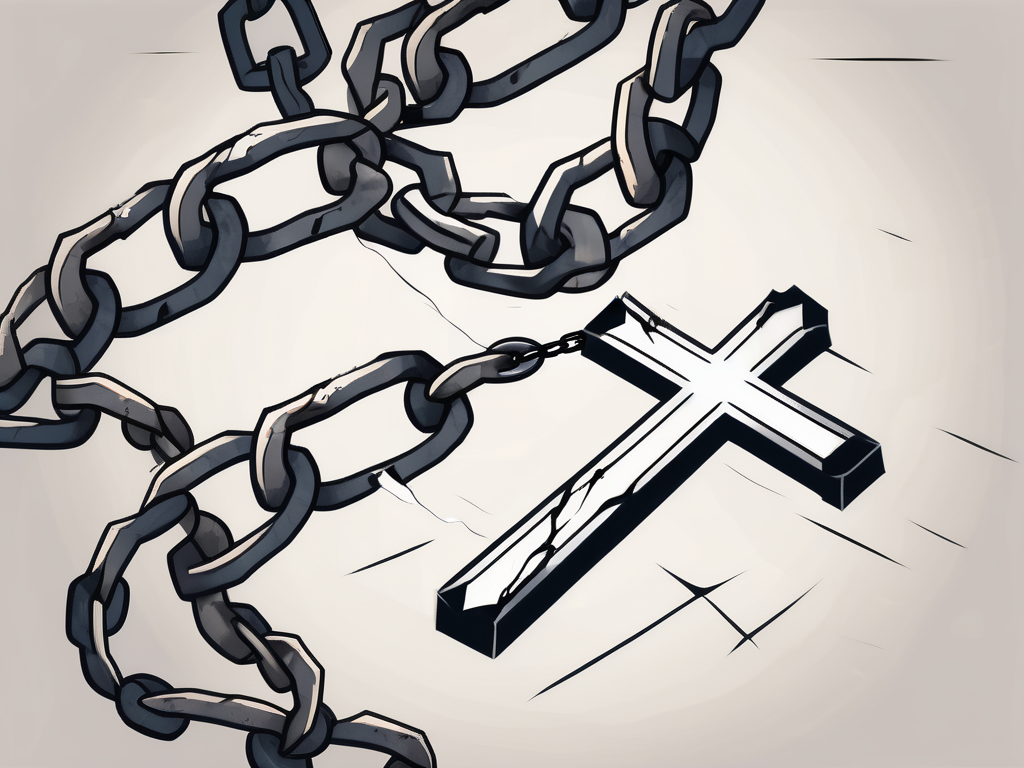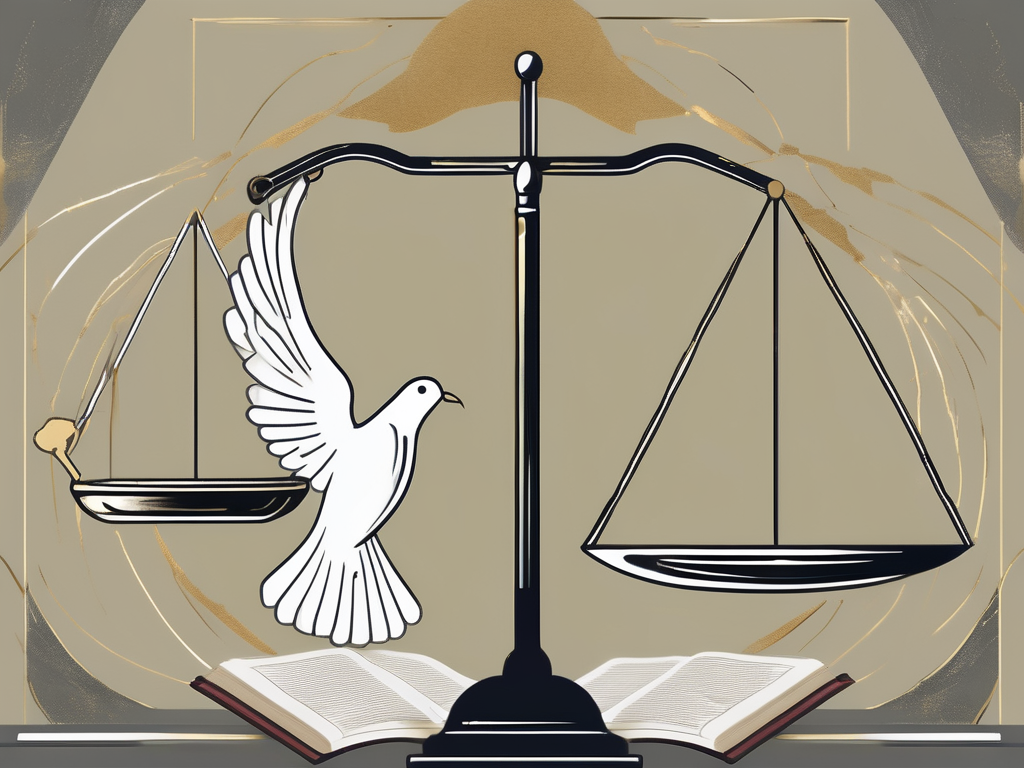Guilt is a complex emotion that we all experience at some point in our lives. It can weigh heavily on our hearts and minds, causing us to question our actions and motives. But what does the Bible have to say about guilt? How does it address this universal human struggle? In this article, we will explore the concept of guilt in a biblical context, examine different types of guilt portrayed in the Bible, uncover the stories that highlight guilt, learn how the Bible suggests dealing with guilt, and understand the role of Jesus Christ in absolving guilt.
Understanding the Concept of Guilt in Biblical Context
When it comes to guilt, the Bible offers profound insights. It teaches us that guilt is not merely a psychological or emotional experience but has significant spiritual implications. In the biblical context, guilt arises from the recognition of violating God’s commands and falling short of His standards. It reminds us of our inherent sinfulness and the need for redemption.
Guilt is a complex emotion that can weigh heavily on individuals. It can manifest in various ways, such as feelings of remorse, shame, and self-condemnation. The Bible acknowledges the power of guilt to affect our thoughts, emotions, and actions. It reminds us that guilt is not to be ignored or dismissed, but rather to be addressed and resolved through repentance and seeking forgiveness.
The Old Testament and Guilt
In the Old Testament, guilt is depicted in various forms. It is often associated with the consequences of disobedience or the failure to follow God’s laws. The repercussions of guilt are demonstrated through stories like Adam and Eve’s disobedience in the Garden of Eden and the subsequent expulsion from paradise. These narratives highlight the weight of guilt and its impact on individuals and communities.
One example of guilt in the Old Testament is the story of King David. After committing adultery with Bathsheba and arranging for her husband’s death, David experiences immense guilt. The psalms he writes during this time, such as Psalm 51, express his deep remorse and plea for forgiveness. This story serves as a reminder that even great leaders can succumb to guilt and need to seek redemption.
Another instance of guilt in the Old Testament is seen in the story of Joseph and his brothers. When Joseph reveals his identity to his brothers who had sold him into slavery, they are overcome with guilt. They realize the pain they caused their brother and are filled with remorse. This story demonstrates the transformative power of guilt, as the brothers eventually reconcile and find forgiveness.
The New Testament and Guilt
In the New Testament, Jesus Christ’s arrival brings a message of hope and forgiveness. While guilt remains an integral part of the human experience, the New Testament emphasizes salvation through faith in Christ. It teaches that Jesus came to offer redemption and liberation from the bondage of guilt. Through His teachings and actions, Jesus demonstrates the power of love and forgiveness in overcoming guilt and sin.
One of the most well-known stories in the New Testament that addresses guilt is the account of the woman caught in adultery. When the religious leaders bring her to Jesus, ready to stone her according to the law, Jesus responds with compassion and forgiveness. He challenges those without sin to cast the first stone, and one by one, they all leave. Jesus then tells the woman, “Neither do I condemn you; go, and from now on sin no more.” This story illustrates Jesus’ ability to release individuals from guilt and offer them a fresh start.
Another example of guilt in the New Testament is the story of Peter’s denial of Jesus. After Jesus’ arrest, Peter denies knowing Him three times, just as Jesus had predicted. When Peter realizes what he has done, he is overwhelmed with guilt and weeps bitterly. However, after Jesus’ resurrection, He appears to Peter and reinstates him, forgiving him for his betrayal. This encounter shows the transformative power of forgiveness in overcoming guilt and restoring broken relationships.
In conclusion, guilt plays a significant role in the biblical context. It serves as a reminder of our fallen nature and the need for redemption. The Bible offers stories and teachings that demonstrate the weight of guilt and its impact on individuals and communities. It also presents the hope of forgiveness and liberation from guilt through faith in Jesus Christ. Understanding guilt in the biblical context can lead to a deeper appreciation of God’s grace and the transformative power of forgiveness.
Different Types of Guilt as Portrayed in the Bible
Within the Bible, we find different types of guilt that individuals experience. These various forms of guilt serve as reminders of our moral responsibility and the need for repentance and reconciliation with God.
Guilt from Sin
This type of guilt arises from knowingly committing acts that are in contrast to God’s commandments. The Bible teaches that sin separates us from God and generates guilt within our hearts. It is a deep sense of remorse and regret for our actions, recognizing that we have fallen short of God’s perfect standard.
When Adam and Eve disobeyed God in the Garden of Eden, they experienced guilt from sin. Their guilt was evident in their attempt to hide from God and their feelings of shame and vulnerability. This guilt served as a reminder of their disobedience and the consequences of their actions.
Throughout the Bible, we see examples of individuals who experienced guilt from sin. King David, for instance, felt immense guilt after committing adultery with Bathsheba and orchestrating the death of her husband, Uriah. His guilt weighed heavily on him, leading him to confess his sins and seek forgiveness from God.
Guilt from sin is not meant to condemn us but rather to lead us to repentance. It is an opportunity for us to acknowledge our wrongdoing, turn away from it, and seek forgiveness from God and those we have wronged.
Guilt from Not Following God’s Commands
In addition to specific sins, guilt can result from failing to follow God’s commands. This guilt stems from a sense of inadequacy in fulfilling our roles as faithful followers. It reminds us of our imperfections and pushes us towards seeking reconciliation and restoration.
When the Israelites wandered in the wilderness for forty years, they often failed to follow God’s commands. Their guilt from disobedience was evident in the consequences they faced, such as being denied entry into the Promised Land. This guilt served as a reminder of their need to trust and obey God wholeheartedly.
Similarly, in the New Testament, the apostle Peter experienced guilt from not following God’s commands when he denied knowing Jesus three times. His guilt was overwhelming, and he wept bitterly, realizing his failure to stand up for his faith. However, this guilt ultimately led to his repentance and restoration, as Jesus forgave him and reinstated him as a leader among the disciples.
Guilt from not following God’s commands can be a powerful motivator for change and growth. It prompts us to examine our lives, identify areas where we have fallen short, and seek God’s guidance and forgiveness.
In conclusion, the Bible portrays different types of guilt that individuals experience. Guilt from sin reminds us of our need for repentance and forgiveness, while guilt from not following God’s commands pushes us towards seeking reconciliation and restoration. Both forms of guilt serve as opportunities for growth and transformation in our relationship with God and others.
Biblical Stories Highlighting Guilt
The Bible contains numerous stories that illustrate the profound impact of guilt on individuals:
Story of Adam and Eve
The account of Adam and Eve in the Garden of Eden serves as a prime example of guilt’s consequences. After disobeying God’s command not to eat from the Tree of Knowledge, Adam and Eve experience guilt and shame, hiding from God. Their guilt is a catalyst for their expulsion from paradise, emphasizing the devastating effects of disobedience.
As Adam and Eve grapple with their guilt, they are confronted with the consequences of their actions. The once harmonious relationship between them and God is shattered, replaced by fear and shame. Their guilt weighs heavily on their souls, causing them to question their worthiness and seek repentance.
Adam and Eve’s guilt serves as a cautionary tale, reminding us of the importance of obedience and the consequences that follow when we succumb to temptation. It highlights the power of guilt to disrupt our lives and the need for redemption to restore our relationship with God.
Story of King David
Another powerful example is the story of King David, who experienced guilt after committing adultery with Bathsheba and arranging the murder of her husband, Uriah. David’s guilt consumed him, leading to a deep sense of remorse and turning to God for forgiveness. This story showcases the transformative nature of guilt and the potential for redemption.
David’s guilt is not easily dismissed or ignored. It haunts him day and night, gnawing at his conscience and causing him great distress. He realizes the gravity of his actions and the pain he has caused others. David’s guilt becomes a driving force for change, compelling him to seek forgiveness and make amends.
In his anguish, David turns to God, acknowledging his wrongdoing and pleading for mercy. He recognizes that only through repentance and sincere remorse can he find solace and restoration. David’s story teaches us that guilt, when acknowledged and confronted, can lead to personal growth and a renewed commitment to righteousness.
Furthermore, David’s journey from guilt to redemption serves as a testament to God’s unfailing love and forgiveness. Despite the severity of David’s transgressions, God extends His mercy and grants him forgiveness, demonstrating the transformative power of repentance and the capacity for redemption.
How the Bible Suggests Dealing with Guilt
When it comes to dealing with guilt, the Bible provides guidance and offers pathways towards healing and restoration:
Guilt is a powerful emotion that can weigh heavily on our hearts and minds. It can stem from various sources, such as hurting others, betraying our own values, or falling short of our own expectations. However, the Bible reminds us that we are not alone in our guilt. It assures us that there is a way to find solace and peace, even in the midst of our remorse.
Seeking Forgiveness from God
The Bible encourages individuals to seek forgiveness from God when burdened by guilt. Recognizing our sins and seeking God’s mercy allows us to find solace and peace. It reminds us that God’s unconditional love and willingness to forgive offer hope and an opportunity for reconciliation.
When we approach God with a repentant heart, acknowledging our wrongdoings and seeking His forgiveness, we open ourselves up to His grace and mercy. It is through this act of seeking forgiveness that we can begin to release the heavy burden of guilt that weighs us down. God’s forgiveness is a balm for our wounded souls, providing us with the strength and courage to move forward.
Repentance and Redemption
Repentance is another key aspect of dealing with guilt. It involves acknowledging our wrongdoing, feeling genuine remorse, and committing to change. The Bible teaches us that true repentance is not just about feeling sorry for our actions but also about taking steps to rectify our mistakes and make amends.
Through repentance, we open the door to redemption and renewal. It is a transformative process that allows us to move forward from our guilt and embrace a renewed life. The Bible reminds us that God’s love is not only forgiving but also restorative. He can take our brokenness and turn it into something beautiful.
As we embark on the journey of repentance, we may encounter challenges and setbacks. It is important to remember that God’s grace is always available to us. He is patient with our shortcomings and is willing to guide us towards a better path. Through His love and guidance, we can find the strength to overcome our guilt and live a life that is aligned with His will.
Dealing with guilt is a process that requires time, patience, and self-reflection. The Bible offers us a roadmap for navigating this journey, reminding us that we are not defined by our mistakes but by God’s grace and forgiveness. By seeking forgiveness from God and embracing the transformative power of repentance, we can find healing and restoration for our guilt-stricken souls.
The Role of Jesus Christ in Absolving Guilt
Central to the Christian faith is the belief in Jesus Christ as the ultimate solution to guilt:
Jesus’ Teachings on Guilt
Throughout His ministry, Jesus emphasized the power of forgiveness and redemption. He taught that through Him, guilt can be released and replaced with divine grace. Jesus encouraged His followers to approach Him with contrite hearts, assured of His love and willingness to absolve their guilt.
The Crucifixion and Guilt
In perhaps the most profound act of love and sacrifice, Jesus took upon Himself the guilt of humanity. By willingly laying down His life on the cross, He provided a pathway for forgiveness and liberation from guilt. His crucifixion represents the ultimate expression of God’s unending love and grace for humankind.
In conclusion, the Bible speaks comprehensively about guilt. It portrays guilt as a direct result of sin and disobedience, while also offering hope and redemption through faith in Jesus Christ. It provides guidance on seeking forgiveness from God, embracing repentance, and finding solace in His unconditional love. As we navigate the complexities of guilt, the Bible offers a roadmap towards healing, restoration, and a renewed relationship with our Creator.












